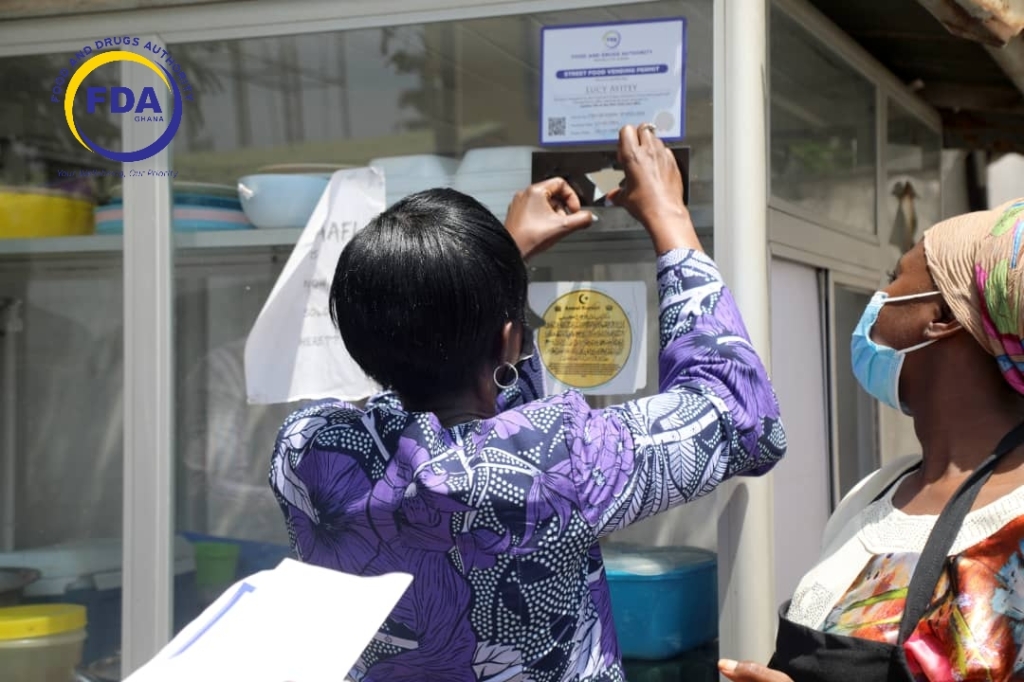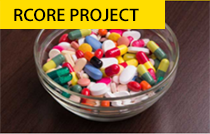
Report Adverse Reaction

Approved fees Schedules

Products Recall And Alert

For Stakeholders

Submit a Complaint

FAQs

Submit Advert Application

Submit Advert Application

Consumer Education
News & Events
Latest News
2024-04-17 00:00:00
Ghana�s COVID-19 Safety Monitoring Effects Receive Global Acclaim2024-04-05 00:00:00
FDA AND AFROCET MONTGOMERY MEETS STAKEHOLDERS2024-03-13 00:00:00
NEW FDA FEES AND CHARGES EFFECTIVE MONDAY 18th MARCH 20242024-02-01 00:00:00
DRAFT GUIDELINE FOR PUBLIC CONSULTATION "FDA GUIDELINE ON IDENTIFICATION AND DATA CAPTURE FOR PHARMACEUTICAL TRACEABILITY"2023-11-17 00:00:00
JOHN OWUSU GYAPONG IS THE NEXT ARUA SECRETARY-GENERAL2023-11-17 00:00:00
FDA LAUNCHES THE NATIONAL TOBACCO CONTROL STRATEGYNO STREET FOOD VENDING PERMITS, NO BUSINESS
Street food vendors in the Korley Klottey Municipality have received with joy, the launch of the Street Food Vending Permit as a laudable initiative of the Food and Drugs Authority (FDA). The event which brought together over 50 street food vendors from the municipality and representatives from the Traditional and Indigenous Caterers Association of Ghana, took place on Wednesday 3rd November 2021, in partnership with the Food and Agriculture Organisation (FAO), Ghana and the Korley Klottey Municipal Assembly.

CEO of FDA, Mrs. Delese Darko pasting a Street Food Vending Permit
Street food micro-industries are vital for the economic planning and development of many societies however, their contribution to our economy is largely underestimated. Globally, a projected 2.5 billion people depend on street foods daily because of their affordability and accessibility (Bellia et al., 2016; FAO, 2016). In urban Ghana, street food vending constitutes an increasingly popular informal business that provides an important source of income for many households and is dominated by women.
In spite of their economic contribution to the many households, studies have shown that some street food vendors lack basic understanding of proper food-handling practices and concerns about poor hygiene and spread of foodborne diseases continue to be the bane of this industry, leading to continuous increase in reported cases of food poisoning.
As part of efforts to meet the Sustainable Development Goals of food security, good health and wellbeing, and inclusive development, the FDA, together with the FAO, initiated the Healthy Street Food Incentives project in 2018. Thus far, the project has among others assisted the FDA to conduct baseline studies and introduced digital management platforms for the management of the street food vending industry in Ghana.
The Chief Executive Officer of the FDA, Mrs. Delese Darko, in her welcome remarks noted that although the street food vending micro-industry is plagued by numerous challenges such as poor public infrastructure (e.g. lack of clean water sources), unsanitary vending locations (e.g. dirty or dusty roads, open-air sewers), poor food handling and unhygienic practices among others, it has over the years proven its potential to contribute to economic sufficiency.

Street food vendors from the Korle Klottey Municipal Assembly
She, therefore, urged participants to support this Street Food Vending Permit initiative that aims at promoting good hygienic practices to ensure that the industry is well supported to minimize the risks of spreading food-borne diseases while promoting safe, healthy and nutritious street food in the country.
The Deputy Country Representative of the FAO, Mr. Benjamin Adjei, added that street food vendors have increased in the last three and a half decades throughout Africa, due to continuous urbanization and has prospects of growth that must not be stifled. He, therefore, encouraged participants at the event to adhere to the hygienic practice that underpins this Street Vending Permit initiative and commit to working at growing their brands and businesses into future world-class franchises.
A total of 22 street food vendors received their permits and items such as aprons and veronica buckets to support their businesses.

THE FDA MISSION
The FDA exist to ensure the safety, quality and efficacy of human and veterinary drugs, food, biological products, cosmetics, medical devices, household chemical substances and clinical trials, and the control of tobacco products through the enforcement of relevant standards to protect public health.

Subscription Management Centre












